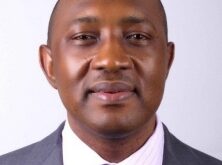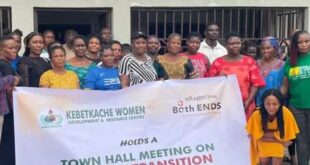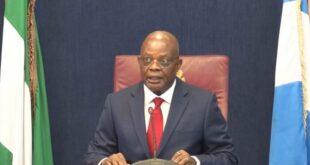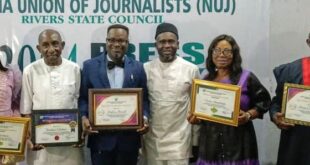As part of efforts to achieve a cleaner and healthier planet, in a community-based intervention tagged ‘Let’s Clean Up Africa,’ the African Climate Reality Project on Monday, May 27, organized a ‘Bag the Waste’ Campaign in Port Harcourt, the Rivers State capital.
The campaign, which kicked off as part of activities marking this year’s Children’s Day at the popular Tourist Beach in Port Harcourt, witnessed the participation of primary school children in the clean up exercise.
According to organizers, the campaign is aimed at building “Eco-ambassadors in schools and communities to maintain a clean and safe environment, with sensitization and donation of waste bins and other waste managenment Items/equipment as part of activities.”
Climate Reality Leader, Smith Nwokocha, who organized the event with support from the African Climate Reality Project, said “What we are doing is ‘Bag the Waste’ campaign and it is championed by African Climate Reality Project. The essence is to clean up the environment.
“So we came to this location which is a Tourist Beach. If you were here earlier, you’d see that the beach was very dirty and a lot of plastics littered all over including some bit of oil spillage.
“But we’re able to clean most parts of the beach and then we have to segregate the dirt from the plastic. We then bagged everything. We bag the plastics separately.”
He said “It was a good thing that children were here. They also had to support and learn what we are doing because we want to conscientize the children as well. So that when they go back home and to their schools they can always clean up the environment.”
Nwokocha noted that the focus on children participating in the clean up was “because today is Children’s Day. So also to mark the day with them, we say okay why don’t we clean up our environment. In the process we even involved some entertainers so that after the whole bagging and learning what is proper and what should be done, we are also entertained in the process.”
Explaining the relationship between a clean Earth and health, Nwokocha said “If you’re not able to bag those wastes, they will go into the river, as you can see the shore of the river (at the beach).
“And what happens? Some of the fish that we manage to have there will eat up. When you eat those fish, what happens? You eat plastic as well. To avoid that, that is why we try to bag those wastes as well.
“Because once you clean up the environment and you bag those, particularly single-use plastic, once you’re able to gather them off, you’re also mitigating the impact of climate change.”
He added that aside from having children learn to bag their waste, both at home and in the school, “we even donated some of the waste bags to the schools, litter bags, litter buckets, you know, and then some cleaning mops, shovels, waste, brooms and the likes for them so that they can take the same back to their school and clean up their environment, so that they sustain the activities, not just a run-off action.
“We’ll visit the school, know how far they’ve gone, continue to sensitize them, conscientize them, so as they grow, they grow up being clean, and then the environment becomes clean, and then all of us will be happy, planning to be healthy as well. We want them to be environmentally conscious, which is what we are doing now.”
Lead teacher at Graith International School, whose students were among participants at the clean up, commended Nwokocha and African Climate Reality Project for choosing her students to participate.
She described the event as “a good initiative, because, you know, right now with the indiscipline about waste, people eat and litter wherever. So the beautiful thing about this whole concept is that they do not just know alone that they have waste, but that they need to bag it and bag it properly.
“It’s a good initiative and the best time to actually send a message is now. Now because they said it’s better to catch them young.
“We also try in school, concerning what we’ve been teaching them. We will try our best to ensure that whatever has been taught. we will do that and ensure that it becomes a part and parcel of the children.
Head teacher at Graith International, Miss Gold Epelle, said the ‘Bag the Waste’ campaign reinforced “what we are teaching them on cleanliness and makes it very easy, because now you don’t need to tell them how to keep the environment clean. When they see a dirt where it’s not supposed to be, they know they need to pick it up and trash it properly.
Junior primary pupil, Chinwendu Nchekwube, said “I learnt to trash waste, away from the river; to stopping putting waste in the river. Because it’s not good for the fishes and for the human beings and life.”
While Kelvin George, a pupil at Graith, said “I learnt that it’s not good to keep your environment unkept. And when you see dirty things, you bag your waste.”
 PH Mundial – Port Harcourt Online Newspaper News Across The Region
PH Mundial – Port Harcourt Online Newspaper News Across The Region





